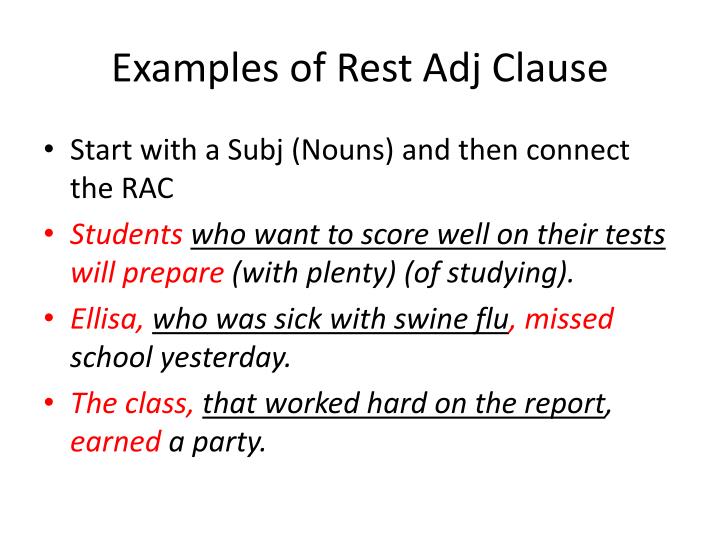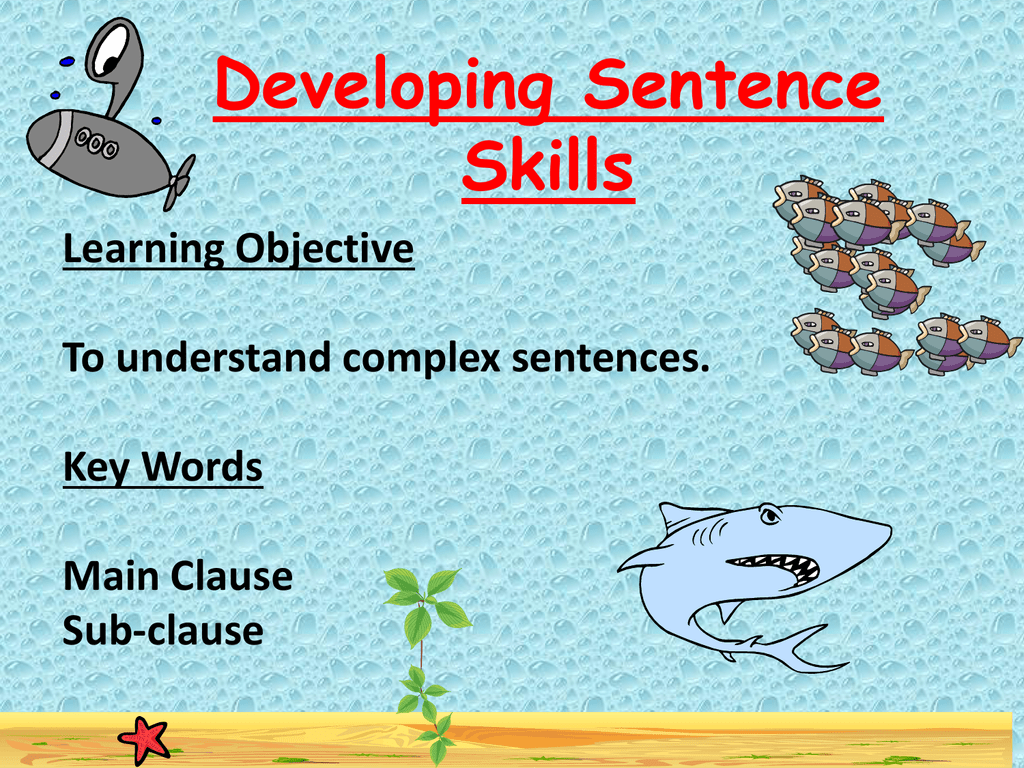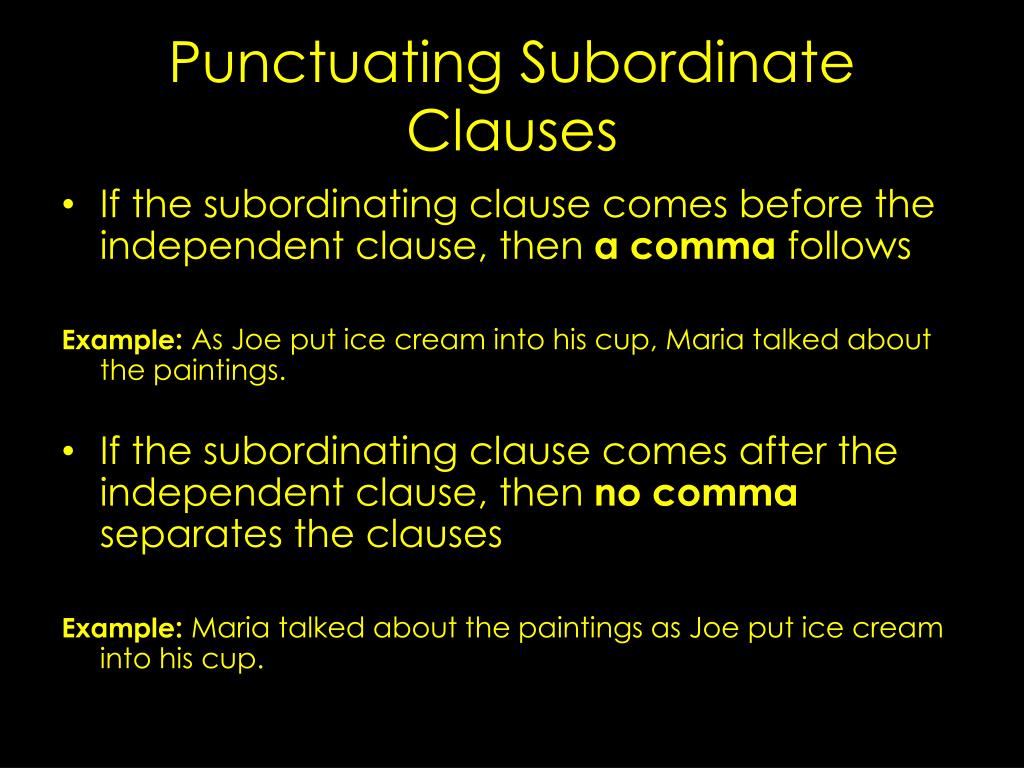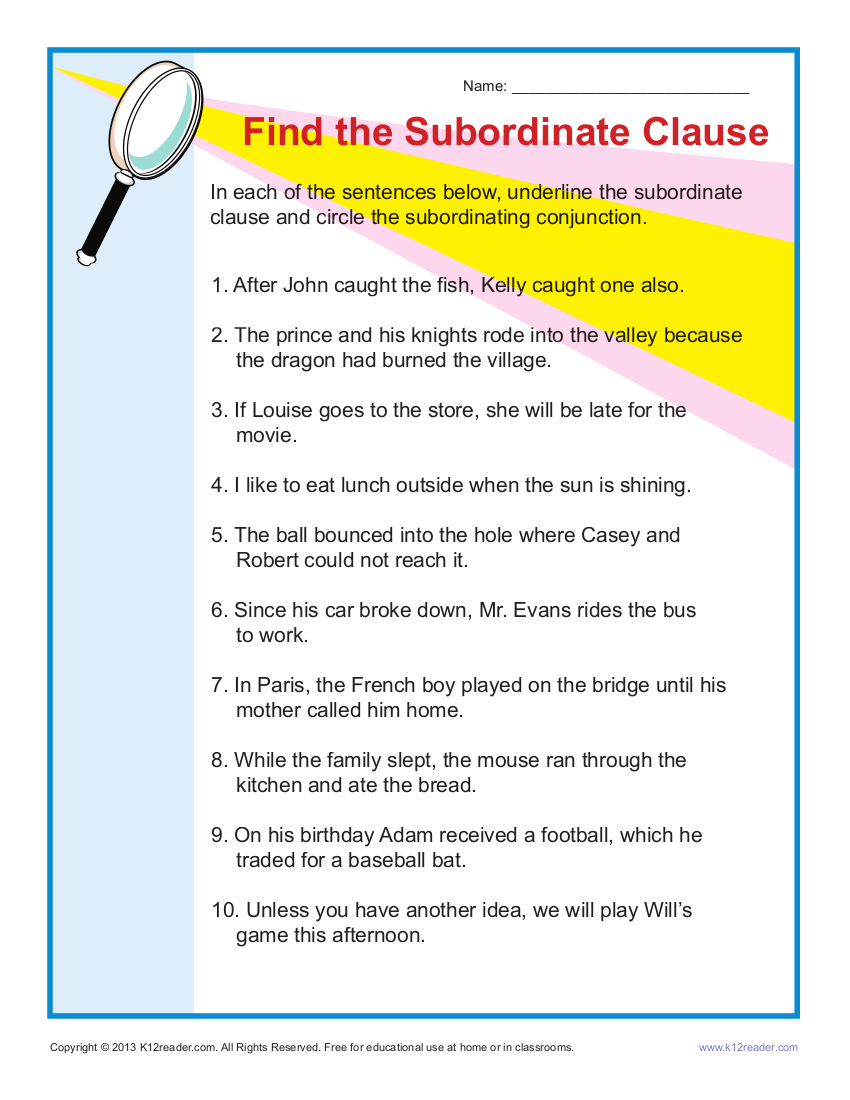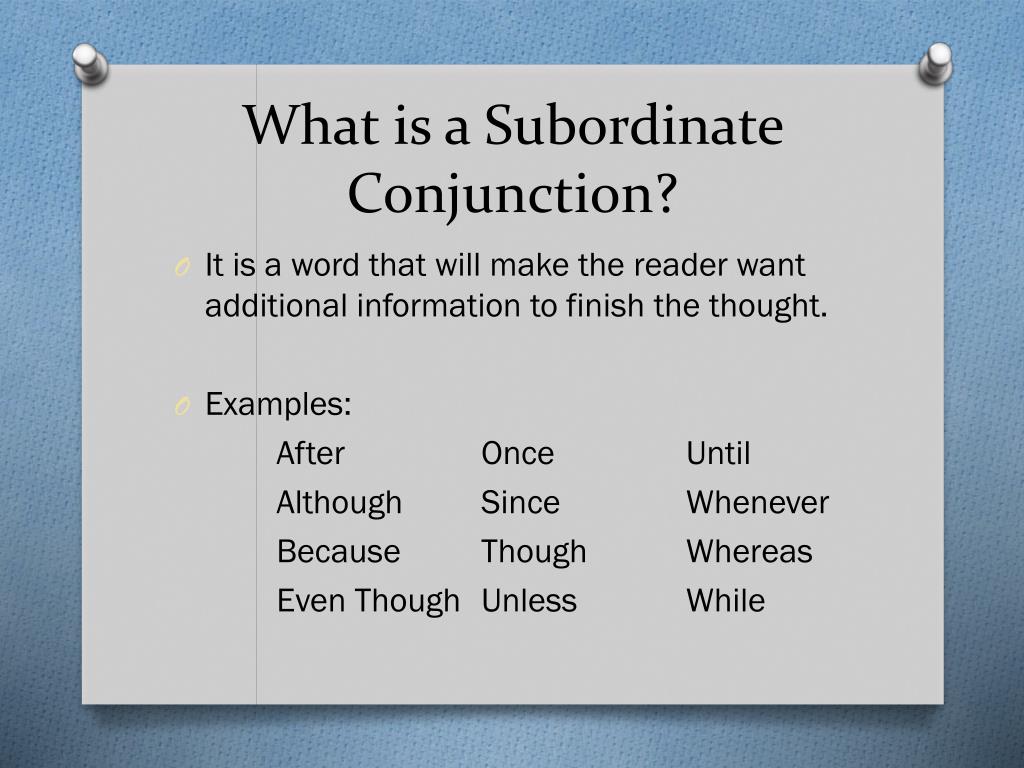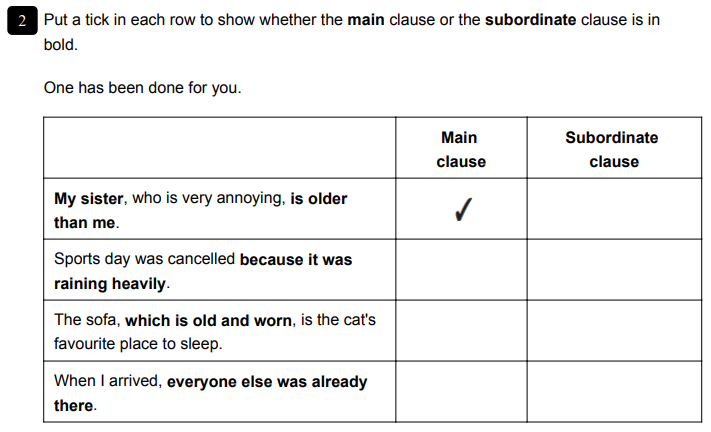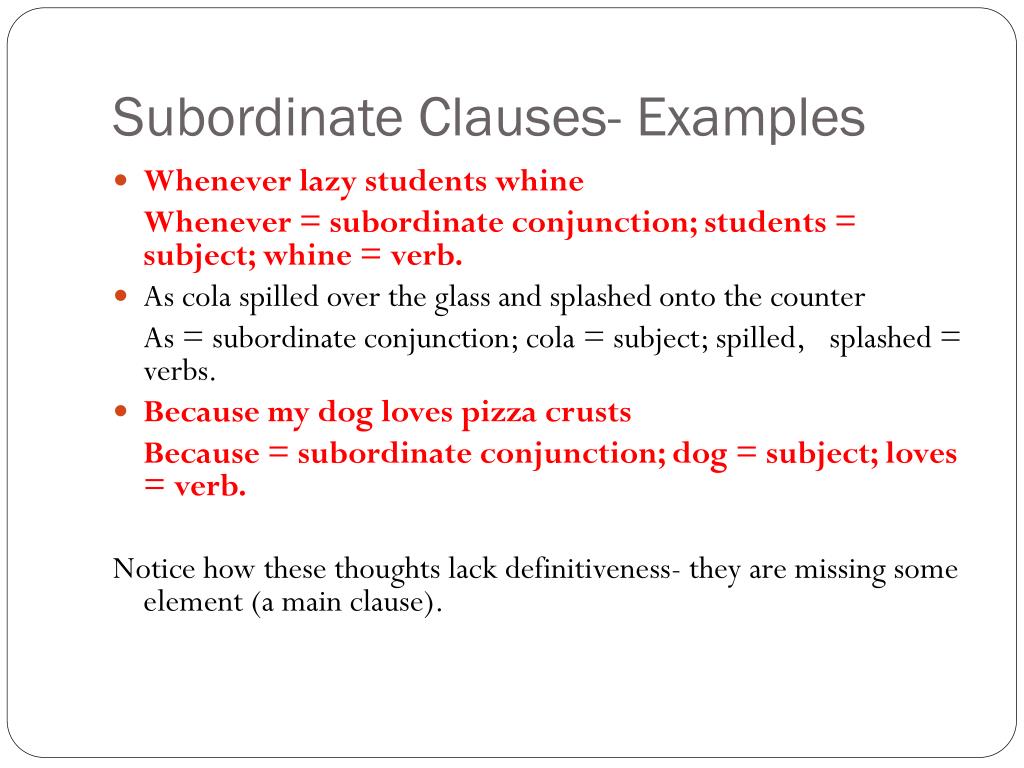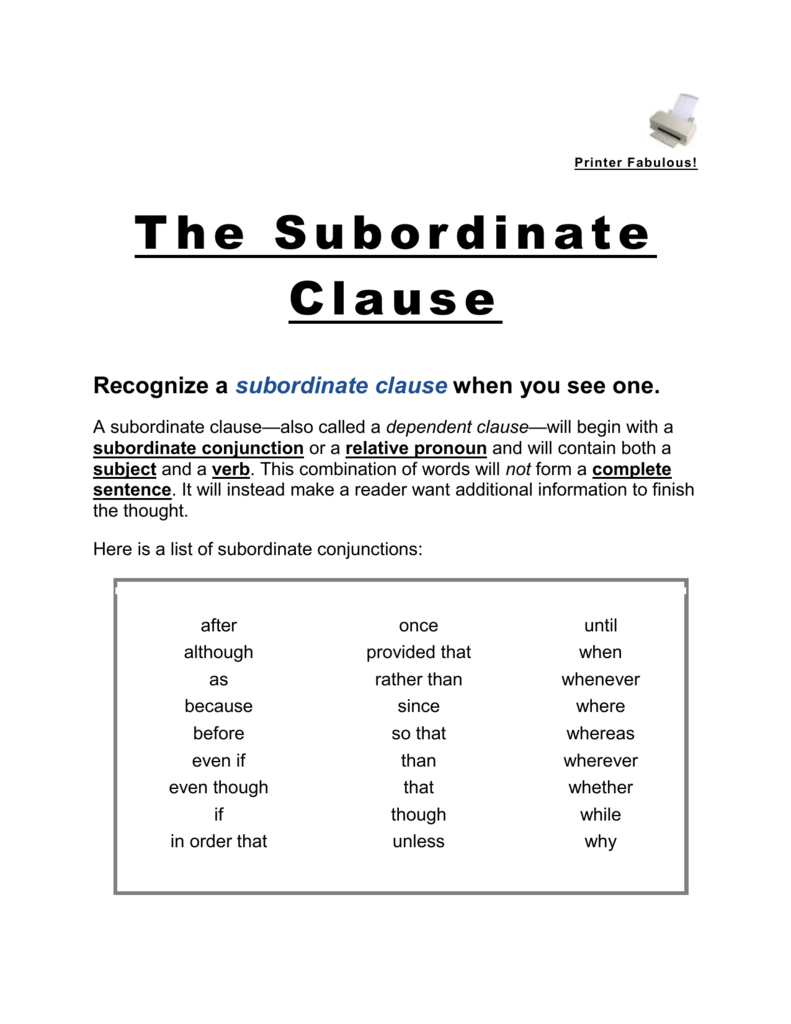A subordinate clause has a subject and verb but, unlike an independent clause, cannot stand by itself. It depends on something else in the sentence to express a complete thought, which is why it's also called a dependent clause. Some subordinate clauses are introduced by relative pronouns and some by subordinating conjunctions ( although, because, if, unless, when, etc.). Subordinate clauses function in sentences as adjectives, nouns, and adverbs. In linguistics, a dependent clause is a clause that augments an independent clause with additional information, but which cannot stand alone as a sentence. Dependent clauses either modify the independent clause of a sentence or serve as a component of it.
Some grammarians use the term subordinate clause as a synonym for dependent clause. Others use subordinate clause to refer only to adverbial dependent clauses. The different types of dependent clauses include noun clauses, relative clauses, and adverbial clauses.
A clause is a group of words containing a subject and a verb or verb phrase. Though an independent clause expresses a complete thought, a dependent clause does not. In other words, a dependent clause cannot stand as a sentence by itself. It must be combined with one or more independent clauses to form a sentence. Dependent clauses can function either as noun clauses, adjective clauses, or adverb clauses in a sentence.
Their grammatical function is that of an adverbial, i.e., they provide information on the circumstances of the state of affairs depicted in the main clause. Among the most widely known adverbial clauses are temporal, locative, modal, causal, conditional, and concessive clauses. Beyond the complex sentence they form part of, adverbial clauses have a crucial function in the creation of a coherent discourse, and are thus a prominent feature, especially of written texts. Adverbial clauses can be found in all languages of the world. In many languages, though, they may look different from the prototypical adverbial clauses known from the major Indo-European languages. Dependent clauses include adverb clauses, adjective clauses, and noun clauses.
They can appear at any point in a sentence and start with signal words. The subject of that verb is winter, but the clause cannot stand on its own as a sentence, as it is incomplete. It has a subject and verb, but can't stand alone as a sentence. It is sometimes called an "adjective clause" because it functions like an adjective—it gives more information about a noun.
A relative clause always begins with a "relative pronoun," which substitutes for a noun, a noun phrase, or a pronoun when sentences are combined. You cannot create a complex sentence without using a subordinate clause in it. Other types of sentences – compound sentences, simple sentences – can exist without subordinate clauses.
When you think about it, the subordinate clause is what makes the sentence 'complex'. The subordinate clause requires the help of the independent clause for it to make sense. It reaches back or forward across the sentence to contextualize itself, making the sentence more 'complex' in the process. As the example above shows, a dependent clause may be finite , or non-finite . Coordinating conjunctions are useful for connecting sentences, but compound sentences often are overused.
While coordinating conjunctions can indicate some type of relationship between the two independent clauses in the sentence, they sometimes do not indicate much of a relationship. The word "and," for example, only adds one independent clause to another, without indicating how the two parts of a sentence are logically related. Too many compound sentences that use "and" can weaken writing. A clause comes in four types; independent, dependent, relative or noun clause. An independent clause, also called a main clause, is a clause that can stand on its own. It contains all the information necessary to be a complete sentence.
A dependent clause is a group of words with a subject and a verb. It does not express a complete thought so it is not a sentence and can't stand alone. These clauses include adverb clauses, adjective clauses and noun clauses. Two or more independent clauses can be joined by using coordinating conjunctions or by using semicolons. The most important thing to remember is that an independent clause can stand alone as a complete sentence.
Relative clauses are dependent clauses introduced by a Relative Pronoun . Relative clauses can be either restrictive or nonrestrictive. In a relative clause, the relative pronoun is the subject of the verb (remember that all clauses contain a subject-verb relationship) and refers to something preceding the clause. The sentence now contains two independent clauses, as "I like to eat candy" and "I don't like to eat popcorn" could both form complete sentences. The example has now become a compound sentence, i.e. one that contains two independent clauses joined by a coordinating conjunction . Like an independent clause, it has a subject and a verb.
It may not, however, express a complete thought and may begin with a signal word called a subordinating conjunction. The chart below outlines common coordinating and subordinating conjunctions discussed in this section. Dependent clauses are groups of words that have a subject and a verb but do not form a complete thought.
Dependent clauses rely on independent clauses for meaning and are also known as subordinate clauses. Like subordinate clauses, adjective clauses cannot stand alone as complete sentences. You must connect them tomain clauses to finish the thought. Dependent Clauses cannot stand by themselves and make good sense. They must be combined with an independent clause so that they become part of a sentence that can stand by itself.
They act either in the capacity of some kind of noun or as some kind of modifier. There are three basic kinds of dependent clauses, categorized according to their function in the sentence. Remember that a dependent clause always contains a subject and a verb, but it cannot stand by itself. Subordination involves turning one of the clauses into a subordinate element through the use of a Subordinating Conjunction or a Relative Pronoun.
When the clause begins with a subordinating word, it is no longer an independent clause; it is called a dependent or subordinate clause because it depends on something else for its meaning. There are other ways of combining ideas — by turning independent clauses into various kinds of modifying phrases. Many subordinate clauses begin with subordinating conjunctions. Examples of these conjunctions are because, unless, if, when, and although.
What these conjunctions have in common is that they make the clauses that follow them unable to stand alone. The clauses act as adverbs, answering questions like how, when, where, why, to what extent, and under what conditions. An independent clause is a sentence that has a subject and a verb and requires no extra information to understand. Dependent clauses, which start with subordinating conjunctions such as "while," "that," or "unless," give background information but cannot stand on their own as sentences. They are also called subordinate clauses, and they will give you the answer to the question you ask to the main clause.
This of course, depends on the type of subordinate clause. I.e., whether they are noun, adjective, or adverb clauses. Two independent clauses can be joined by a conjunction, punctuations, or a conjunctive adverb.
So you know that independent clauses can be standalone sentences. But not every sentence will be made of just one clause. If two clauses are closely related, you can connect them into one sentence. Just remember that you need at least one clause to be independent for the sentence to make sense.
Coordination is when you connect two or more independent clauses. Subordination involves connecting an independent clause and a subordinate clause. In most cases, joining two independent clauses (i.e., clauses that can stand alone as complete sentences) by a comma creates a comma splice. Like a phrase, a clause is a group of related words; but unlike a phrase, a clause has a subject and verb. An independent clause, along with having a subject and verb, expresses a complete thought and can stand alone as a coherent sentence.
In contrast, a subordinate or dependent clause does not express a complete thought and therefore is not a sentence. A subordinate clause standing alone is a common error known as a sentence fragment. A fragment either lacks a subject or a verb, or it does not express a complete thought. Writers often mistakenly consider dependent clauses complete sentences because they contain subjects and verbs. However, dependent clauses do not express complete thoughts.
Remember to pair a dependent clause with at least one independent clause to form a complete sentence. Many students understand that a complete sentence contains a subject and a verb, but what if that sentence does not create a complete thought? Dependent clauses may look a whole lot like independent clauses, but they are only meant to complement the independent clause and not stand on their own.
Dependent clauses, which consist of a subject and verb, are groups of words that cannot stand alone as a sentence. Explore different types of dependent clauses, and learn how to differentiate between dependent clauses, phrases, and sentence fragments. The sentence 'I am glad to be alive' is the highlight here. Yet, the usage of the two different conjunctions and two different dependent clauses can change the meaning of the sentence completely. Thus, the subordinate clause is heavily dependent on the main clause, it just cannot survive on its own. A clause is a collection of words and is a part of a complete sentence.
Dependent Clause Examples In Literature You may be aware that there are three types of sentences―simple, compound, and complex. Compound and complex sentences are the ones that contain clauses. These clauses are generally joined together with a conjunction.
The subordinate clause is a type of clause which relies on the main clause in order to form a full sentence. On its own, a subordinate clause cannot make a complex sentence. This type of clause has a verb and a subject just like any other clause does, it is also known as a dependent clause.
This type of clause is used to add more information to a sentence. In formal writing, adjective clauses begin with the relative pronouns who, that or which. In informal writing or speech, you may omit the relative pronoun when it is not the subject of the adjective clause. Note how the subordinating conjunctions in the above examples are linking the dependent with an independent clause.
You can use the conjunction at the beginning or between the sentence depending on which conjunction you are using. Also, remember to use a comma to separate the clauses. A compound-complex sentence contains at least two independent clauses and at least one dependent clause. As we mentioned earlier, a subordinate clause is another way of terming a dependent clause.
Both words, subordinate and dependent, offer clues to help us better understand the function of these clauses in writing. Dependent means contingent on or determined by, whereas subordinate means lower in rank or position. That tells us that – grammatically speaking – subordinate/dependent clauses are not equal to the independent clause in a sentence.
Dependent clauses are usually marked by dependent words, such as subordinating conjunctions or relative pronouns. Subordinate clauses are also commonly called relative clauses, dependent clauses, adjective clauses, descriptive clauses, or who clauses. Academic writing expresses complex ideas and, as a result, often requires sentences that are equally complex.
For this reason, it's not uncommon to see comma splices—joining two independent clauses with a comma—in your work as the demand for complexity increases. Below you'll find ways to recognize and correct these kinds of errors. In the following sentence, because introduces the adverbial clause in which van is the subject and needed the verb. The independent clause The group of tourists decided to have lunch in the village is necessary to complete the thought.
Again, the subordinate clause as a whole acts as an adverb, telling why the tourists decided to have lunch in the village. In the next example , which is the relative pronoun that begins the subordinate clause. Celebrities is the subject of the clause and attended is the verb.
In the complete sentence, this clause functions as an adjective describing ceremony. In the following sentence, the relative pronoun that is the subject of its clause and won the Pulitzer Prize is the predicate. Its role in the complete sentence is to modify novel, the subject of the independent clause. When you join a dependent clause to an independent clause, you are not joining equals. One side of the resulting sentence is stronger, and the other side is weaker, or subordinate. (If you are a subordinate at work, you do as you're told.) The words used to join unequal pairs of clauses are called subordinating conjunctions.

